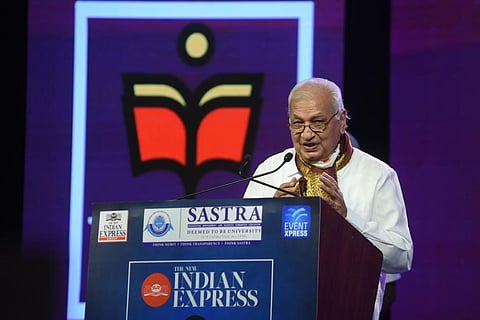

CHENNAI: Saying that the hijab is essential to Islam is an attempt to push back Muslim women into their homes, Kerala Governor Arif Mohammed Khan said at the second day of the 10th ThinkEdu Conclave organised by The New Indian Express on Wednesday, March 9. Speaking on the topic ‘Education: Victim of Identities’, he said that several Muslim women have broken the glass ceiling and have gone on to even join security forces. It would be a disservice to them to say that the hijab is intrinsic to Islam. It would push them into the guilt of not being able to follow an essential tenet of their faith, he added.
Referring to the recent hijab controversy in Karnataka, he stated that educational institutions may prescribe their own dress code and this has been in existence for a long time. "I am of the view that this is no controversy, this is a conspiracy," he said. He added that such conspiracies are to limit career prospect of Muslim women so their interest in education is reduced.
In a reference to the Rajiv Gandhi Government reversing the Shah Bano judgement in 1986, he said that a certain section that is spearheading the hijab row is unnerved as they are not able to enjoy the same kind of clout with the present government. With the Triple Talaq law passed in the Parliament in 2019, radical changes including a decline in divorce rates by 90%, have been brought in.
WATCH |
Speaking on the inclusivity of Indian culture, he said that it is based on a universal vision that does not view a person in terms of variable and alien-able characteristics like caste but with the view of divinity. “If you look at civilisations all over the world, every civilisation was defined by either race or language or religious faith particularly in medieval times. This results in exclusion of minorities,” he said. However, in India, right from the beginning, the defining parameter has neither been race nor language nor faith possibly because we had diversity in all these sectors, he added.
Khan stated that it was defined by ‘Atma’ which does not exclude even animals or trees and, therefore, it had always been all inclusive.“The rishis and saints here have viewed diversity as the law of nature. Diversity can itself become a source of strength and all people should not be confined to one single interpretation of reality,” he added.
Touching upon the National Education Policy, he said that the policy seeks to transform our education institutions into nurseries that promote Indian knowledge tradition.
Speaking at the event, Prabhu Chawla, Editorial Director, TNIE, said about Arif Mohammed Khan that, “He believes in unity in diversity. He is a political governor but not a confrontationist governor but a persuasionist governor. He is also a scholar. For him conviction is not a matter of convenience.”
ThinkEdu 2022 is the grand tenth edition of what has consistently been India's biggest education conclave for a decade now. Stalwarts of India's academic, economic and political ecosystems are sharing their ideas, ideologies and reflections on the past, present and future of India's education system at the event.
Over the last nine years, the conclave has seen stalwarts such as former Presidents, Dr APJ Abdul Kalam and Dr Pranab Mukherjee, MPs Jairam Ramesh, Smriti Irani, former CM of Jammu and Kashmir Farooq Abdullah, NITI Aayog's CEO, Amitabh Kant, and spiritual guide Sadhguru.